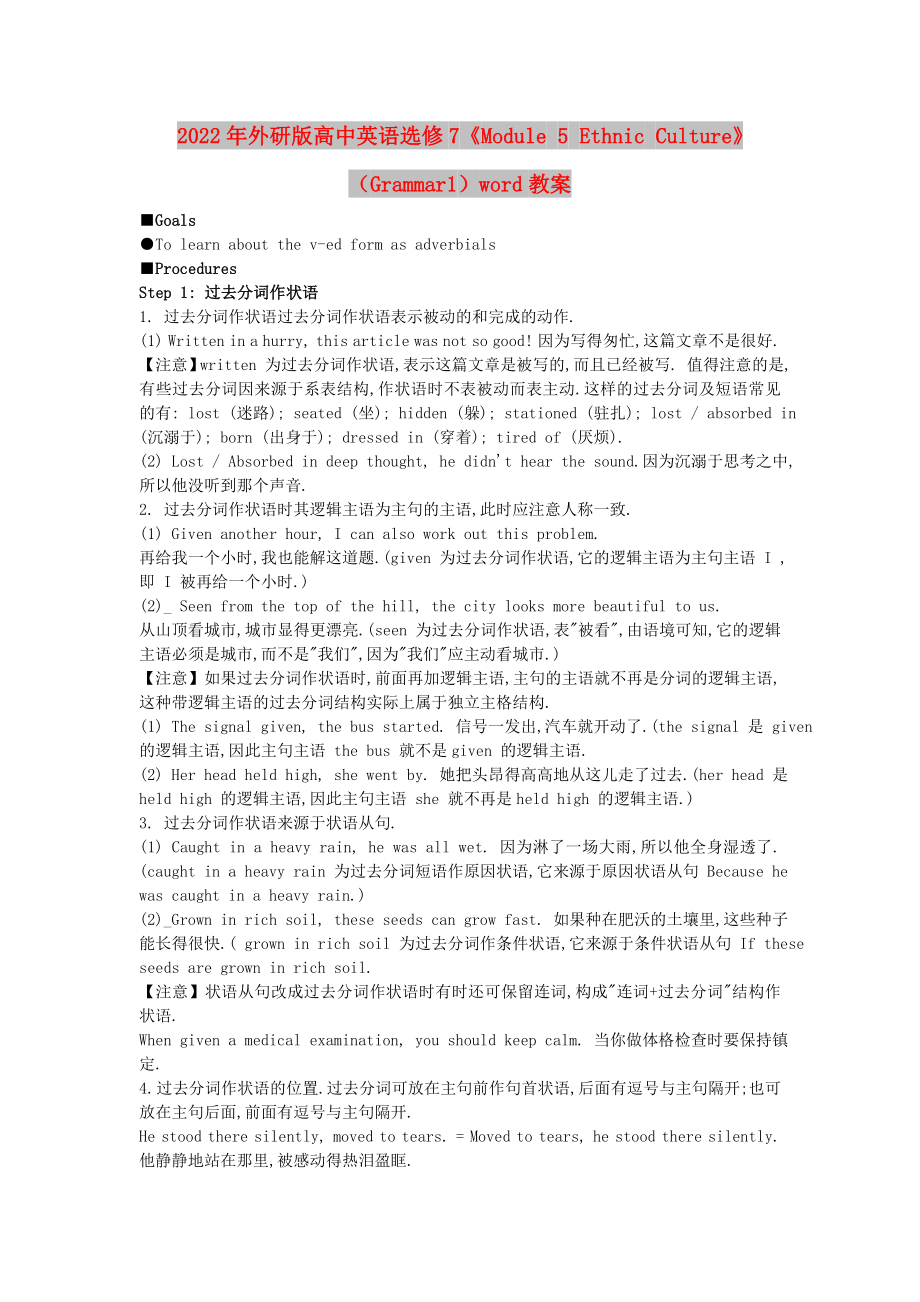《2022年外研版高中英語選修7《Module 5 Ethnic Culture》(Grammar1)word教案》由會員分享,可在線閱讀�,更多相關《2022年外研版高中英語選修7《Module 5 Ethnic Culture》(Grammar1)word教案(2頁珍藏版)》請在裝配圖網上搜索。
1�、2022年外研版高中英語選修7《Module 5 Ethnic Culture》(Grammar1)word教案
■Goals
●To learn about the v-ed form as adverbials
■Procedures
Step 1: 過去分詞作狀語
1. 過去分詞作狀語過去分詞作狀語表示被動的和完成的動作.
(1) Written in a hurry, this article was not so good! 因為寫得匆忙,這篇文章不是很好.
【注意】written 為過去分詞作狀語,表示這篇文章是被寫的,而且已經被寫. 值得注意的是,有些過去分詞
2����、因來源于系表結構,作狀語時不表被動而表主動.這樣的過去分詞及短語常見的有: lost (迷路); seated (坐); hidden (躲); stationed (駐扎); lost / absorbed in (沉溺于); born (出身于); dressed in (穿著); tired of (厭煩).
(2) Lost / Absorbed in deep thought, he didn't hear the sound.因為沉溺于思考之中,所以他沒聽到那個聲音.
2. 過去分詞作狀語時其邏輯主語為主句的主語,此時應注意人稱一致.
(1) Given another
3����、 hour, I can also work out this problem.
再給我一個小時,我也能解這道題.(given 為過去分詞作狀語,它的邏輯主語為主句主語 I ,即 I 被再給一個小時.)
(2)_ Seen from the top of the hill, the city looks more beautiful to us.
從山頂看城市,城市顯得更漂亮.(seen 為過去分詞作狀語,表"被看",由語境可知,它的邏輯主語必須是城市,而不是"我們",因為"我們"應主動看城市.)
【注意】如果過去分詞作狀語時,前面再加邏輯主語,主句的主語就不再是分詞的邏輯主語
4�、,這種帶邏輯主語的過去分詞結構實際上屬于獨立主格結構.
(1) The signal given, the bus started. 信號一發(fā)出,汽車就開動了.(the signal 是 given 的邏輯主語,因此主句主語 the bus 就不是given 的邏輯主語.
(2) Her head held high, she went by. 她把頭昂得高高地從這兒走了過去.(her head 是 held high 的邏輯主語,因此主句主語 she 就不再是held high 的邏輯主語.)
3. 過去分詞作狀語來源于狀語從句.
(1) Caught in a heavy
5、rain, he was all wet. 因為淋了一場大雨,所以他全身濕透了. (caught in a heavy rain 為過去分詞短語作原因狀語,它來源于原因狀語從句 Because he was caught in a heavy rain.)
(2)_Grown in rich soil, these seeds can grow fast. 如果種在肥沃的土壤里,這些種子能長得很快.( grown in rich soil 為過去分詞作條件狀語,它來源于條件狀語從句 If these seeds are grown in rich soil.
【注意】狀語從句改成過去分
6��、詞作狀語時有時還可保留連詞,構成"連詞+過去分詞"結構作狀語.
When given a medical examination, you should keep calm. 當你做體格檢查時要保持鎮(zhèn)定.
4. 過去分詞作狀語的位置.過去分詞可放在主句前作句首狀語,后面有逗號與主句隔開;也可放在主句后面,前面有逗號與主句隔開.
He stood there silently, moved to tears. = Moved to tears, he stood there silently. 他靜靜地站在那里,被感動得熱淚盈眶.
Step 2: Read the sentence
7���、s and underline the V-ed forms
(a) Spoken by fewer and fewer people these days, the Naxi language may disappear in the future. (because)
(b) Seen from above, the old town is a maze of canals, little bridges and tiny streets. (when)
(c) Passed from father to son, the music has not changed for eigh
8����、t centuries. (because)
(d) Looked at from a distance, the Xishan Hills resemble a sleeping beauty. (when)
(e) pletely rebuilt, the town would not be so interesting. (if)
Step 3: Rewrite the sentences, beginning with the words given above
For reference
(b) When it is seen from above, the old tow
9��、n is a maze of canals, little bridges and tiny streets.
(c) Because it is passed from father to son, the music has not changed for eight centuries.
(d) When they are looked at from a distance, the Xishan Hills resemble a sleeping woman.
(e) If it were pletely rebuilt, the town would not be so int
10���、eresting.
Step 4: plete the sentences with the correct form of the verbs in the box
know give invite lose visit
1) When _____ in spring, the hills are covered with flowers.
2) _______ as one of the loveliest places in China, Yunnan is now visited by many tourists.
3) _______ in th
11���、e tiny streets, we decided to ask for help.
4) _______ into a Naxi home, you should accept with pleasure.
5) If _______ something you don’t want to eat, just refuse politely.
For reference
1) visited 2) Known 3) Lost 4) Invited 5) given
Step 5: Write plete sentences with the correct form of
12、 the words
1. discover/ only recently/ old town/ be/ still very quiet
2. visit/ large numbers/ tourists/ old town/ can get very crowded
3. build/ side/ mountain/ village/ be /very attractive
4. cook/ traditional way/ food/ be delicious
For reference
1. Discovered only recently, the old town is still very quiet.
2. When visited by large numbers of tourists, the old town can get very crowded.
3. Built on the side of a mountain, the village is very attractive.
4. When cooked in the traditional way, the food is delicious.
 2022年外研版高中英語選修7《Module 5 Ethnic Culture》(Grammar1)word教案
2022年外研版高中英語選修7《Module 5 Ethnic Culture》(Grammar1)word教案

